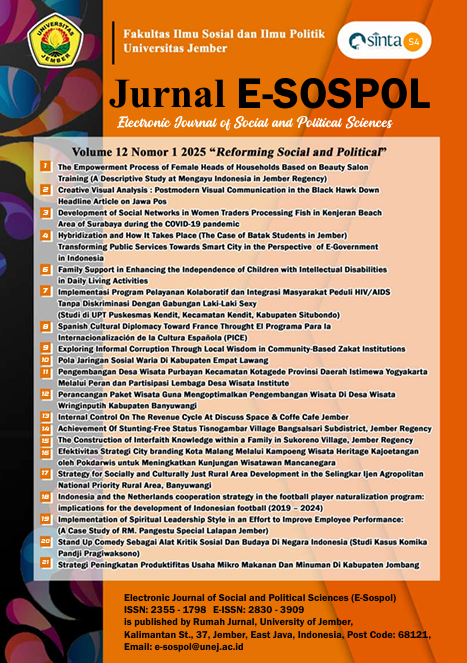Efektivitas Strategi City branding Kota Malang Melalui Kampoeng Wisata Heritage Kajoetangan oleh Pokdarwis untuk Meningkatkan Kunjungan Wisatawan Mancanegara
DOI:
https://doi.org/10.19184/e-sospol.v12i1.53699Abstract
This study aims to examine the effectiveness of Malang City's city branding strategy through the management of Kampoeng Heritage Kajoetangan by the Pokdarwis (Tourism Awareness Group) in increasing international tourist visits. City branding is understood as a strategic communication tool used by cities to build a global image and attractiveness, in this case focusing on heritage areas as representations of local identity. Pokdarwis serves as the grassroots actor implementing branding strategies through historical narratives, cultural preservation, digital promotion, and collaboration with government and tourism sectors. This research adopts a qualitative approach using a case study method. Data were collected through in-depth interviews, field observations, documentation, and literature studies. The findings show that the city branding strategy executed by Pokdarwis is relatively effective in enhancing the attractiveness of Kajoetangan for international tourists, as indicated by an increase in foreign tourist visits over the past two years. This effectiveness is supported by community synergy, strong cultural storytelling, and consistent promotion through social media and tourism events. These findings highlight the crucial role of local communities in city diplomacy and strengthening international image through culture-based tourism.
Downloads
Downloads
Published
Issue
Section
License
Penulis yang mengusulkan naskahnya untuk dapat diproses penerbitannya pada e-SOSPOL dianggap telah menyetujui beberapa hal sebagai berikut:
1. Penulis tidak dapat menarik naskah yang telah usulkan untuk diproses hingga mendapat jawaban dari Ketua Dewan Penyunting atas status naskah artikel ilmiahnya (diterima atau ditolak untuk diterbitkan).
2. Penerbit tidak bertanggung jawab terhadap kasus plagiasi atas artikel yang terbit pada e-SOSPOL
3. Penerbit tidak bertanggung jawab atas data dan isi dari artikel yang diterbitkan pada e-SOSPOL, dan sepenuhnya merupakan tanggung jawab penulis.







